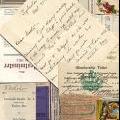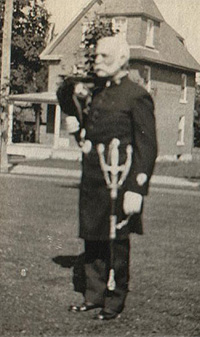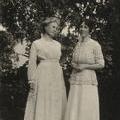 The letter was addressed to Mrs. N. Nicholson, Richmond, Quebec. It read: "Dear Mrs. Nicholson. Do you feel that breakfast seems incomplete without a bread of some sort? Just break open a biscuit made with Crisco." This was ad copy, I realized, despite the header "Mac Rae Bros. Pure Food Products." "Notice its sweet appetizing aroma. Then taste it. You'll say you never ate biscuits of such lightness and flavor." Slick ad copy. I checked the postmark. Chicago, Illinois. Aha! A direct mail advertisement from 1916 addressed to my husband's great grandmother, Margaret McLeod Nicholson, and buried for almost ninety years in an old family trunk. I was intrigued.
The letter was addressed to Mrs. N. Nicholson, Richmond, Quebec. It read: "Dear Mrs. Nicholson. Do you feel that breakfast seems incomplete without a bread of some sort? Just break open a biscuit made with Crisco." This was ad copy, I realized, despite the header "Mac Rae Bros. Pure Food Products." "Notice its sweet appetizing aroma. Then taste it. You'll say you never ate biscuits of such lightness and flavor." Slick ad copy. I checked the postmark. Chicago, Illinois. Aha! A direct mail advertisement from 1916 addressed to my husband's great grandmother, Margaret McLeod Nicholson, and buried for almost ninety years in an old family trunk. I was intrigued.
During WWI, Procter and Gamble tried to convince Maggie Nicholson, a woman the family genealogy claims won many awards for her bread making, to switch to their new vegetable oil product, Crisco. Interesting. Margaret must have tried it, for a coupon had been removed, but she had not been won over. How do I know? Because I also have her 1917 butter bill!
A TREASURE TROVE OF FAMILY -- AND EASTERN TOWNSHIPS -- MEMORABILIA
That day I had stumbled upon a virtual treasure trove of family - and Eastern Townships - memorabilia. It seems as if Great Grandpa Norm Nicholson never threw anything out.
Along with the mailer and butter bill, the trunk contained an avalanche of invoices, receipts and bills; personal correspondence from 1874 to 1930 with mention of the Wales bequest and the Donald Morrison Affair; complete household accounts from 1880 to 1922; election memorabilia, including a Richmond-Wolfe District chart of voting results; correspondence and diaries related to the patriarch's careers as hemlock bark dealer, building inspector for the Town of Richmond, government tie and concrete inspector; and bill collector for one Dr. W. A. Moffatt, who moved to Vancouver in 1912 after losing thousands in a local investment fiasco (I've got the press clipping).
I've also found militia mementos and sundry paper curios like St. Andrew's Society membership cards, church financial reports, concert programs, even train ticket stubs. Ah, and love poems too. This man, Norman, for all his obsessive record keeping, was a die-hard romantic. From an 1879 diary, his courtship:
"While floating down the stream of life,
Within a bark canoe,
O may you have a jolly time
And also room for two."
 From an 1883 diary, his marriage: "136 dollars for furniture, 5 dollars for a ladies ring and 50 cents for a frying pan."
From an 1883 diary, his marriage: "136 dollars for furniture, 5 dollars for a ladies ring and 50 cents for a frying pan."
YOUR LOVING AND AFFECTIONATE HUSBAND
Norman Nicholson (seen here in his militia uniform) adored his feisty life partner. The 1911-1912 letters are proof-positive: he closes each one with "your loving and affectionate husband, NN."
Norman was away that year working in the muskeg and mud at Cochrane, Ontario, building a roundhouse for the Transcontinental Railway. (He hated the lay of the land, it was so FLAT.) Liberal MP and Bromptonville businessman E.W. Tobin had recommended him for the job.
Margaret (in her late fifties) was home alone for the first time. Their children were grown up, with one daughter, Flora, away at teacher's college, two others, Edith and Marion, in Montreal teaching, and a son, Herb, out West, drifting from banking job to sales job in a series of new-sprung pioneer towns like Elbow, Saskatchewan.
 WHAT A YEAR FOR MARGARET!
WHAT A YEAR FOR MARGARET!
And what a year it was for Margaret! She was living her life with one laced boot firmly planted in the Victorian era, the other in modern times. She still had "her day at home" receiving callers, up to ten a day; she still tended sick relatives in all-night vigils. But she also attended political rallies. A letter to Norm in 1911 referred to the upcoming free trade election (which the Laurier Liberals lost in a landslide): "You will know now that Parliament is dissolved and you better try and make some arrangement with Tobin. Yesterday they had their liberal convention, he was chosen again without a dissenting voice. In the afternoon they had their speeches in the Town Hall. I went, of course, with Marion and Flora, as Edith was out at Kingsbury for the day. The first speaker was Tobin in English and then French."
It's no surprise daughter Flo (seen here with mother Margaret) had designs on becoming a suffragist, or that Edith became Provincial Commandant of the Red Cross during WWII, or that Marion became head of a powerful teachers' union in the 40's.
Back in 1911-1912, Margaret's day-to-day existence was fraught with anxiety. Not that she complained to Norm. In winter she fretted over finding enough wood to heat her home and cook with; in summer she worried about her garden and the bugs destroying her potatoes.
 In January of 1912 her brother, Dan McLeod took ill with consumption. He died in March. Margaret feuded with sister Bella and her husband, Clayton Hill, over who was to take in Grandma. In June Grandma died. Margaret feuded with Bella and Clayton over money in the will. It seems that this rather stoical Presbyterian reserved "harsh words" for Englishmen, Methodists and this irksome Mr. Hill, a rich Conservative who had the audacity to own an automobile.
In January of 1912 her brother, Dan McLeod took ill with consumption. He died in March. Margaret feuded with sister Bella and her husband, Clayton Hill, over who was to take in Grandma. In June Grandma died. Margaret feuded with Bella and Clayton over money in the will. It seems that this rather stoical Presbyterian reserved "harsh words" for Englishmen, Methodists and this irksome Mr. Hill, a rich Conservative who had the audacity to own an automobile.
Margaret did have her pressures. Three of her son Herb's creditors called in their 'notes' that year. This further burdened the Nicholson family financially.
MOVE OUT WEST?
They deliberated whether to sell and move out West but there were already twelve homes for sale in Richmond that summer, and many more available to rent. Besides, Norm and Marg and the girls loved "Tighsolas" too much. Norm had built the house (left) himself in 1896 at a cost of $2817.35, not including landscaping.
The forestry industry in Richmond was in decline. All the good wood had been cut and sold. Professionals were migrating west: the notary, Rowatt, and the dentist, Dr. Skinner, to the Prairies, and the Minister, Reverend Dr. Carmichael, to Toronto. Wrote Margaret: "He has been offered a job in Scarborrow. 9 minutes by electric train to Toronto, so of course he will take it." This brain drain worried daughter Edith for other reasons. "What will Richmond be without Rowatt," she wrote to Norm. "He was such a good Liberal." Losing friend and family doctor Moffatt especially concerned Margaret: "I don't trust the doctors in this town. Let's hope we don't get sick," she wrote. A worry, indeed! There were many more deaths than usual that spring in Richmond. Everyone remarked on it.
 Still, life that year had its giddy moments. The Order of the Eastern Star had come to Richmond (for the wives of Masons) and Margaret joined with bells on. She had to sew herself a white dress for her initiation. Margaret also took a number of uplifting trips: "I was invited to go to Lingwick with Henry and left Tuesday am at 11 had dinner at the Magog Hotel then went for a walk called on Mrs. McLeod and Arthur Lockhart, principal of the high school. Then left by CPR to Scottstown at 4 pm... I enjoyed it so much."
Still, life that year had its giddy moments. The Order of the Eastern Star had come to Richmond (for the wives of Masons) and Margaret joined with bells on. She had to sew herself a white dress for her initiation. Margaret also took a number of uplifting trips: "I was invited to go to Lingwick with Henry and left Tuesday am at 11 had dinner at the Magog Hotel then went for a walk called on Mrs. McLeod and Arthur Lockhart, principal of the high school. Then left by CPR to Scottstown at 4 pm... I enjoyed it so much."
THE TITANIC
All this in the year the Titanic sank. Margaret: "Oh was that not dreadful the sinking of the Titanic. The accounts are so heart-rending. I saw Mr. Hayes once this summer at the train at Richmond. Edith told me who he was." Hayes, the President of the Grand Trunk Railway, was the most prominent Montrealer to go down on the Titanic. Norm: "I note what you said about the terrible boat accident. It is one of the worst I ever heard. With such a lot of important men to go down with it that the country cannot afford to lose in a way but, I suppose, their places will be filled and in a short time and they will not be missed."
THE HISTORY BUG
Down to earth people, these Nicholsons, proud Presbyterians, prouder Canadians, a people whose own ancestors had seen much harder times. You see, I've caught the 'history bug' and I've done some research. The Scots of the Eastern Townships emigrated in three waves in the mid-19th century from the famine-stricken Isle of Lewis, in Scotland, with little but the clothes on their back and the blood of Celts and Vikings coursing through their veins. At least that's what a Canadian Historical Society paper on the ethnography of the Eastern Townships claims. The description of their emigration suggests these particular Nicholsons were indeed poor. Kenneth Nicholson arrived on the Lady Hood in August of 1841 at Port St. Francis, Quebec, with his wife and nine adult children in tow after a voyage of many weeks during which they ate only oatmeal.
Some walked, some rode in carts to Sherbrooke and then on to Lingwick where they settled on crown land, earning money by burning wood for potash and cutting trails through the forest. Malcolm, Norman's father, 26, moved to Flodden and had four children. He died in 1894, leaving a farm with eight cows at 20 dollars, one two-year old heifer at 12 dollars, and a mare worth 40 dollars -- total assets: $668.12; total debts: $137.54. Yes, that trunk contained a complete inventory of the family farm!
When I tell my husband he issues from some of the poorest settlers ever to leave the Highlands, he isn't particularly impressed. Funny, after reading their letters, I am, and I come from English Methodists!
(See Tighsolas: House of Light, Part 2: A Long-Lost Relic Comes Home)
*Dorothy Nixon is a Montreal-based writer who specializes in women's issues and education.
**Tighsolas means "House of Light" in Gaelic. The family homestead was filled with windows.